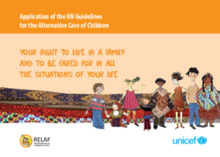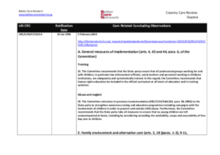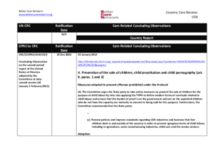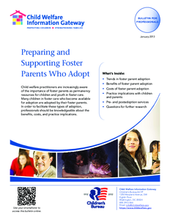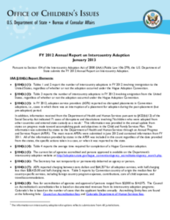This page contains documents and other resources related to children's care in the Americas. Browse resources by region, country, or category.
Displaying 2901 - 2910 of 3116
Charts that accompany the article Orphan Fever: The Evangelical Movement’s Adoption Obsession, illustrating the trends in international adoptions from Liberia, Kyrgyzstan, Ethiopia, Uganda, and Haiti to families in the United States.
This new radio report from US National Public Radio (NPR) challenges some of the misconceptions about fostering, including that people foster for the money or that foster parents “must be saints to take in other people’s children”. Two main speakers, a foster parent for over 15 years to more than 40 children, and a Professor at the University of Richmond School of Law share their insight and experiences about fostering in the US context.
This RELAF booklet, Application of the UN Guidelines for the Alternative Care of Children, is a child-friendly guide to the Guidelines of for the Alternative Care of Children meant for children and adolescents to inform them of their right to live with their families and make that right a reality.
Zero to Three, a US based non profit organization working to inform, train and support professionals, policy makers and parents to improve the lives of infants and toddlers, combined the evidence from research on early childhood development with feedback from focus groups with families, friends, and neighbors who act as care givers to develop a range of practical resources to strengthen care practices with children between the ages of 0 and 3.
This country care review includes the care related Concluding Observations adopted by the Committee on the Rights of the Child as part of its examination during the sixty-second session (14 January- 1 February 2013) of Guyana’s combined second, third and fourth period reports to the Convention on the Rights of the Child, as well as other care-related concluding observations, ratification dates, and links to the Universal Periodic Review and Hague Intercountry Adoption Country Profile.
Selon l'UNICEF et l'Institut du bien-être social et de recherche environ 80% des enfants qui se trouvent dans les orphelinats en Haiti ont un parent proche. Ces enfants sont le plus souvent abandonnés par leur famille parce que celles-ci manquent de moyens pour subvenir à leurs besoins, selon l'UNICEF qui attribue ce problème à l'extrême vulnérabilité de ces enfants en Haïti.
This country care review includes the care related Concluding Observations adopted by the Committee on the Rights of the Child as part of its examination of the United States of America’ second periodic report under the Optional Protocol to the Convention on the Rights of the Child on the sale of children, child prostitution and child pornography, as well as other care-related concluding observations, ratification dates, and links to the Universal Periodic Review and Hague Intercountry Adoption Country Profile.
This book focuses on the lives of six mothers who had been pariahs and then became partners with child welfare commissioners, social workers, lawyers, foundation officers, and child welfare agency executives. It recounts how their courage and resilience brought about the most significant changes in the history of New York’s child welfare system.
This document provides an overview of the benefits, costs, and practice implications for adoptions from foster care in the US.
This document presents the data on intercountry adoptions to the United States in the Fiscal Year 2012, as per the U.S. State Department.


